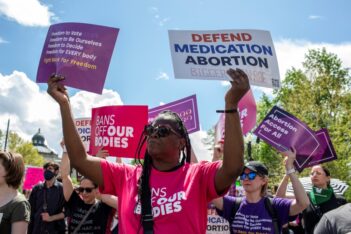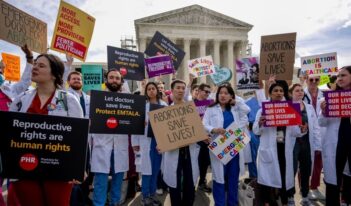
Under the state’s recently enacted restrictions, experts say access to abortion has been effectively gutted.
Earlier this month, Texas enacted the strictest abortion restrictions the United States has seen since before the U.S. Supreme Court’s decision in Roe v. Wade, nearly 50 years ago.
By passing a law known as SB 8, the Texas legislature enacted what legal experts consider a “near-total ban” that prohibits abortions after six weeks without exceptions for rape, incest, or sexual abuse. The new law also contains what critics describe as an “unusual” provision that deputizes private citizens to sue any individual who “aids or abets”—or even intends to assist—a pregnant person seeking an abortion after six weeks.
Because SB 8 places the role of enforcement entirely in the hands of private citizens rather than the government, critics of the law fear that SB 8’s enforcement provision could create serial abortion “bounty hunters” since citizens are enticed to sue by the promise of a $10,000 cash reward for successful claims.
Even if a passing stranger suspected that a person pregnant past the six-week mark was going to use a rideshare service to travel to an abortion clinic, the stranger—despite having no relationship with the pregnant person—would be permitted to bring a lawsuit against the rideshare driver for assisting or intending to assist in obtaining an abortion past the permitted time frame.
For now, it appears that this unique enforcement strategy is helping to keep the Texas law in place because private citizens sue in place of the government, bypassing Roe’s constitutional right to an abortion as a defense. Shortly before SB 8 took effect in Texas, the Supreme Court declined an emergency request to stop the bill from entering into force. According to some abortion rights advocates, the nature of SB 8’s restrictions—and the Supreme Court’s refusal to block them—signal that Roe v. Wade could be on its way to being overturned.
Proponents of SB 8, including Texas Governor Greg Abbott, claim that the bill is far from a ban on abortions because it technically provides six weeks for a pregnant person to obtain an abortion.
According to experts, however, this statement is misleading. The law’s prohibition on abortions after six weeks does not mean that a person has been pregnant for six weeks. Rather, the six-week clock begins to run from the end date of an individual’s last menstrual cycle.
This nuance is crucial, physicians note, because most people are unaware that they are pregnant six weeks after their last period because menstrual cycles can be highly irregular. Under SB 8’s definition of “six weeks,” an individual may have no reason even to suspect that they are pregnant before it is too late. Physicians have pointed out that menstrual periods can frequently be up to two weeks late for any reason at all, such as stress or change in diet unrelated to pregnancy.
According to experts, the Texas law further exacerbates ongoing public health issues and access to reproductive health care in Texas. Due to years of anti-abortion advocacy and public policies in the state, much of Texas already experiences limited access to abortion, contraception, or basic maternity care.
In Texas, which contains the highest medically uninsured rate in the nation and maternal mortality rates among the “worst in the developed world,” abortion rights advocates argue that the ban will impose the heaviest burdens on poor individuals and people of color. After all, not everyone can take time off work, find adequate childcare, or afford to travel hundreds of miles out of state to receive an abortion. Although the law has only been in place for a little over two weeks, neighboring states have already seen an influx of Texas patients seeking abortions.
Abortion rights advocates also worry that the law will lead to hospital wards reminiscent of a world before Roe, where emergency room patients often died from sepsis following self-induced abortions.
Access to basic care may be further restricted by limited hospital capacity to treat non-COVID patients, especially given low vaccination rates and rising COVID-19 cases overwhelming hospitals and ICUs across Texas.
Critics worry that if SB 8 remains in place, its restrictions will soon be a reality across the country, as proponents of the Texas law seek to enact similar measures in other states.
It remains unclear, however, whether or how long SB 8 will remain in place. This month, the U.S. Department of Justice filed suit against the state of Texas, arguing that SB 8 was “enacted in open defiance of the Constitution.” The case is expected to move quickly and may reach the Supreme Court in a matter of weeks.
The future of abortion access will then rest in the hands of five justices.



